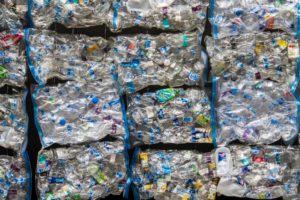
Blog
A Blueprint for America’s Recycling Future
“We have never, ever, ever failed in America when we have acted together.”
On January 20, 2021, on the West Front of the U.S. Capitol, the newly inaugurated President Biden offered a clear message. To achieve great things, we must work together to pursue big ideas and find solutions that work for all Americans.
But working together isn’t limited to Democrats and Republicans reaching across the aisle. Solving our biggest challenges will require all Americans — government, business, citizens and more — to tackle the challenges that lie ahead.
One of those challenges is the waste crisis. While it may have faded in visibility as we’ve worked to fight the pandemic, the intensity of the problem has only grown. It is not some looming threat, but one that is here, now. We see it in the recyclable debris blowing down the sides of our highways or washing up on our shores. It cannot be ignored and it cannot be solved by any one industry, business or president alone.
A range of stakeholders have worked on packaging and recycling issues for years — from local governments to NGOs to industry. Meaningful commitments and large-scale changes were made — in the CPG industry, for example, the 25-largest companies all have commitments to improve the environmental footprint of their packaging. But individual successes need coordination to truly scale and make a real impact. For example, if the recycling system can’t properly process recyclable packaging, either because of dated technology or contamination due to confused consumers, commitments to use more recycled content in new packaging will continue to be difficult or impossible to meet.
Working together, however, the equation changes. The interconnectedness and, frankly, interdependency of recycling stakeholders make it necessary for us to come together on solutions or risk failing apart. Failure isn’t an option. The recycling system must function to meet a whole range of packaging waste reduction goals, which led Consumer Brands to bring together the Recycling Leadership Council (RLC) in early 2020, resulting in today’s release of the Blueprint to an American Recycling System.
The RLC is comprised of more than 20 organizations, representing consumer-facing industries, packaging suppliers, NGOs and academic thought leaders, all united by the idea that sweeping change is imperative to modernize and advance recycling in America and integral to the long-term health of the planet.
Recycling is not a stand-alone solution to address the national packaging and recycling crisis, but it is a critical foundation to keeping valuable material out of landfills and back into packaging and products. The RLC spent the last year collecting data and facilitating conversations with key stakeholders to identify best practices for and obstacles to an effective, scalable recycling system. It leveraged these insights and the group’s expertise to put forward a vision for the future of recycling.
Is it perfect? Of course not. Every stakeholder in the process will have its own point of view that may differ from parts of the blueprint. But the blueprint is a product of give and take, just like meaningful change on recycling will be.
The RLC went into a long and sometimes difficult process, undaunted by the weight of the challenge and emerged from it with a set of federal policy ideas in the bipartisan spirit of what is actionable, what can make a real difference and, of course, compromise. Now, the group is showing its work and asking that businesses, environmental groups, academic leaders and government officials join together on executing the proposed solutions that we feel will result in tangible, lasting change to our recycling system and environment.
The work is far from over. The RLC is committed to bringing more stakeholders to the table and making the blueprint a reality, allowing our planet to reap the benefits of a working recycling system.
As President Biden reminded, we’ve never failed when we act together. But we will go nowhere if we fail to act.
Published on February 4, 2021
Our Updates, Delivered to You
Receive the latest updates from the Consumer Brands Association.



